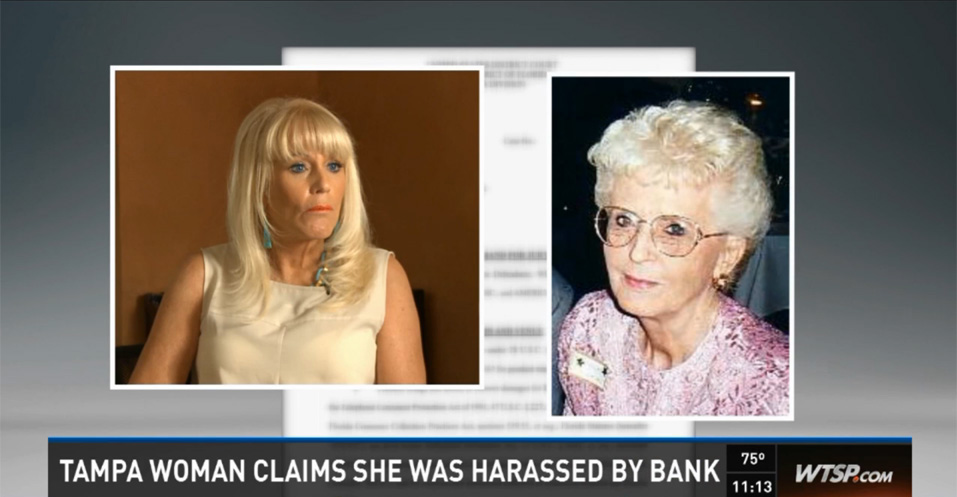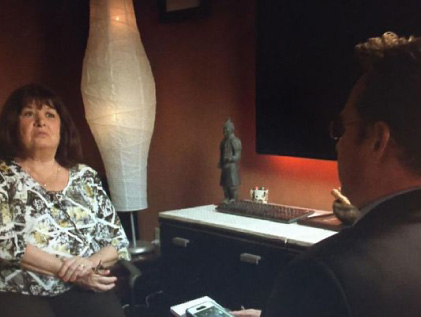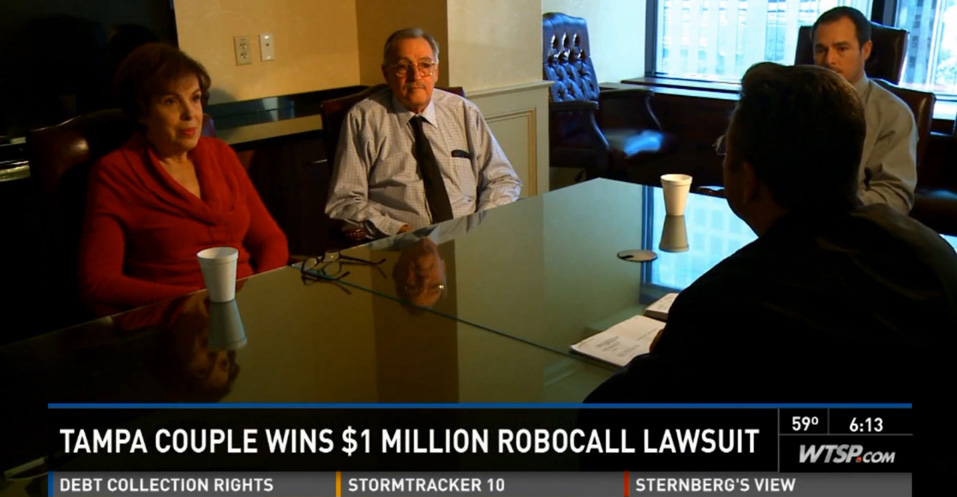WTSP 10 News: “Man Sues After Reportedly Getting Repeated Robocalls”
Eric Glasser, WTSP
In late April, Florida joined several other states by filing a lawsuit against Ocwen Loan Servicing, which is based in West Palm Beach, Florida.
The lawsuit accuses Ocwen of causing widespread harm to thousands of borrowers.
Jeff Heard says he is one of those Ocwen customers.
“Their business practices are like nothing I’ve ever seen,” said Heard.
Heard says in his opinion, Ocwen Loan Servicing has been trying to take the house his father George left him when he died five years ago.
“Absolutely. They wanted the equity. They wanted the home,” said Heard. “They had no intention of assisting me in any way.”
When Jeff’s father, George Heard, died, the family assumed that the insurance policy his dad had paid into every month along with his mortgage payment would pay off the balance.
“The life insurance was charged on their statement as a premium,” said Heard, “And was through one of their insurance carriers. And they were responsible to collect and assist in getting that insurance paid.”
But instead, Jeff has kept making payments to avoid foreclosure.
He says he’s gotten hundreds of robocalls from Ocwen, demanding he keep paying the debt plus fees.
Ocwen, he says, has also refused to acknowledge his father’s death, despite providing them multiple copies of the death certificate.
“In fact it was so many times, I had to go and buy additional copies of the death certificate just to have them on hand to provide Ocwen their constant request for this death certificate,” he said.
This isn’t the first time we’ve reported about Ocwen.
In August, Mitchell Perry told us he’d gotten relentless robocalls from Ocwen as well.
In Perry’s case, the loan wasn’t even his.
“Their own attorney said they shouldn’t be calling me,” he said.
The case settled the same week we aired our report.
Two weeks ago, Florida Attorney General Pam Bondi joined other states and federal prosecutors, suing Ocwen, after hearing a lot more of these stories.
The suit accuses the financial giant of filing illegal foreclosures, mishandling loan modifications, and more.
“It’s our responsibility to protect the 125,000 mortgage holders in the state of Florida from these bad mortgage practices,” Bondi said. “So we will hear the rest of it out in court, but we had to take action because enough is enough.”
Jeff Heard says he had had enough, too.
In a phone call between Heard and an Ocwen agent, who refuses to discuss and possibly resolve the issue over the phone, he tells Heard his deceased father is still listed as the borrower.
“And every time I call, they say they don’t have it, and I send it again. And I’m not gonna send it anymore. I’m going to get an attorney and file suit. You’re playing games. The house has mortgage insurance on it. Somebody over there is playing games. And it’s not funny anymore. I’m going to sue you,” he told the Ocwen agent.
At one point Heard says he was so desperate, he pretended to be his own dead father on the phone – just to try to get someone at Ocwen to do something.
Finally, he hired attorney Dave Mitchell with the law office of Maney Gordon.
“The claims that we’re bringing in this case, the conduct that was a direct overlap with the conduct the attorneys general are charging Ocwen with in that lawsuit,” said Mitchell.
Heard is not only suing Ocwen for what’s happened in his case, but also for the hundreds of robocalls made to his cell phone which he says he asked them to stop making.
Under the Telephone Consumer Protection Act, such calls could cost the party who places them up to $1,500 per call.
In a statement, Ocwen spokesman John Lovallo said, “We dispute Mr. Heard’s claims. We have valid defenses to argue against them in court, and plan to vigorously defend the company against these allegations.”
Still, Heard said the federal and state lawsuits let him know he’s not alone, and hopes it sends Ocwen a message.
“If this lawsuit would keep one other family from having to go through the harassing and abusive calls from Ocwen,” said Heard, “it would be well worth it.”
WTSP 10 News: “Man dealing with relentless robocalls fights back”
Eric Glasser, WTSP 11:10 PM. EST August 17, 2016
It’s another case of banks accused of behaving badly; you know, relentless robocalls — even after being told to stop it.
This time it involves debt collectors allegedly badgering a man to the point where he finally filed a lawsuit, and the target of those calls could have just as easily been you.
“It’s been very frustrating for me,” said Mitchell Perry.
Perry says no matter how many times he told Ocwen Financial Services “don’t call this number again. Stop calling me,” the calls kept coming.
In recorded messages, Perry is assured by a collections agent, “I have already updated the records, sir. We do apologize for the inconvenience, okay?”
But it wasn’t okay. The calls kept coming and Perry threatened to sue.
“I believe the number was about 250 calls over six months,” said Perry.
In some of these cases it may be harder to sympathize. Somebody borrows money, they don’t pay it back, and then they don’t want to face the music; so they try to use the Telephone Consumer Protection Act to keep collectors from hounding them.
So what makes Mitchell Perry’s case stand out? Mr. Perry isn’t even an Ocwen customer.
“It’s very upsetting to be called by a loan service company for a loan I don’t have,” said Perry.
And the person they were looking for?
“It was no one I knew,” said Perry.
And that’s why this could just as easily had been you on the other end of all those calls. You see, someone else apparently used Perry’s phone number on a loan. So, Ocwen understandably called that number when it was time to collect.
Yet even after Perry had made the mistake clear and demanded the robocalls stop, the collector on the other end of the line told him, “Well, I cannot guarantee that sir.”
“Why,” asked Perry.
“Well, it’s not our fault, sir, that that person used your number,” came the answer.
And so the calls kept coming. So frequently that Mr. Perry even changed the outgoing message on his answering machine.
“If you’re calling for someone else, please do not call this number again,” it said.
Perry’s attorney, Dave Mitchell with the Tampa law firm Maney Gordon says it’s one of the most egregious violations of the Telephone Consumer Protection Act he’s ever seen. Perry’s number appearing on the loan may not have been Ocwen’s fault, but continuing to call his client after the error had been pointed out? “They have to stop or else it is a violation of the law,” said Mitchell.
Now, you may be saying to yourself – why should Ocwen just take Mr. Perry’s word for it? Well, it wasn’t just his word.
“Even though they had been told by Mr. Perry, by the state, by the federal government, and by their own attorneys to stop making these calls; they continued for months,” said Mitchell.
Mr. Perry, who lives in Wisconsin, first turned to that state’s consumer protection department. They investigated the complaint and told Ocwen to stop calling Mr. Perry.
In a letter dated July 1, 2015 to Wisconsin’s Department of Agriculture, Trade, and Consumer Protection, an attorney representing Ocwen even acknowledged “No further calls should be made to his (Perry’s) phone number… And this matter should be resolved.”
Mr. Perry thought so too.
“Their own attorney said they shouldn’t be calling me. The calls still continued for months after that day,” he said.
Perry turned to a Florida Law firm, he said, because Ocwen is located in Florida and he was advised that if he proceeded with legal action Florida would be the appropriate state in which to do so.
If found to be in violation of the federal law, companies can be ordered to pay up to $1,500 for each phone call knowingly made after they’ve been told stop, said Mitchell.
In this case, both sides reached a settlement.
Ocwen’s attorneys released what they called a joint statement, saying: “This matter has a unique and unusual set of circumstances. We are pleased that the parties involved in this matter have reached an amicable resolution.”
“I hope that they will change their practices and actually listen to the people that are telling them you have the wrong number,” said Perry. “Please stop calling me. And take it seriously.”
WTSP 10 News – “Woman: Bank kept calling about dead mother’s mortgage”

St. Petersburg, FL — A Tampa Bay woman is suing Wells Fargo for what she calls years of harassing if not cruel phone calls from debt collectors contacting her, on occasion, several times a day, asking to speak with her deceased mother about paying off her mortgage.
Yes: Deceased.
Karen Hicks hopes her lawsuit sends a message to what she calls, “banks behaving badly.”
“Continued, relentless pursuit of torment,” is how Hicks describes her 6½-year experience with Wells Fargo Home Mortgage. Hundreds of badgering phone calls, made to her home and cell phone, demanding to speak with her late mother, Donna, even after Karen had asked them to stop.
“She’s deceased,” Hicks would tell them. “I’ll make a note, we won’t call you anymore,” she says they would respond. But then? “Five minutes later I would get another phone call,” she says.
When Donna Hicks passed away in 2008, Karen says she decided to keep the family home by paying off the mortgage. About $67,000.
But, according to the allegation made in court documents, Wells Fargo would not deal with Karen, the trustee of her mother’s estate, even though her name was now on the deed. Callers would speak only with the person named on the loan, Karen’s deceased mother.
“Each one of those calls reopened wounds and made it very difficult to cope and grieve,” said Hicks’ attorney, David Mitchell, with the law firm of Maney & Gordon.
Despite sending a death certificate and other relevant documents, Wells Fargo declined for years, says Hicks, to negotiate with her to settle the loan.
The home fell into foreclosure, racking up insurance costs, fees and penalties.
By January 2015, that $67,000 balance had ballooned to more than $200,000.
That lead Hicks to conclude the bank wanted more than the $67,000 it would have gotten from her if she had paid off the loan.
“They were out for the property,” she said, “That was their sole goal.”
Documents show Wells Fargo eventually acknowledged what it called its “oversight,” but Hicks says the bank would not back down from its now far-higher cost to pay off the loan.
The bank did, however, issue a letter addressed to “Donna Hicks Deceased,” offering to discontinue the telephone calls.
The letter thanked Donna Hicks for her clearly impossible, recently-made phone call, and it also required a signature from Karen’s dead mother.
“I’m sorry, she’s in heaven,” Hicks said she told them when they tried to call for her mom. “If you have got a line to there, I’d be grateful to talk to her, too.”
Hicks says she was trying anything at that point to get through to the people calling.
“From tears to humor, in the sense of – of just having some human compassion,” said Hicks.
Mitchell says he’s dealt with clients who’ve also received relentless phone calls, but in this case, he says, his client wasn’t even the person named on the loan.
“You have rights, and you have the right to tell them to stop calling. And if they keep calling, it’s a violation of federal law,” said Mitchell.
In January 2015, Hicks finally sold her mother’s house for $255,000.
Most of it, she says, went to Wells Fargo.
She could just put this episode behind her, now. But instead, Karen Hicks is suing for the money she feels she should not have had to pay, plus legal penalties of up to $1,500 for each call she received after she had told the bank to stop contacting her.
“It’s the principle of the thing, now,” said Hicks.
In a response to the suit now filed with the court, Wells Fargo argues that Karen’s mother was party to a class-action lawsuit settled last year, and so Karen should be precluded from making a claim stemming from the foreclosure.
Wells Fargo spokesperson Michelle Palomino also responded to a request for comment with the following written statement: “We were in contact with Ms. Hicks between 2010 and 2014 for a legitimate business purpose related to a property in an estate for which she was the trustee. However, due to active litigation we are unable to comment further at this time.”
WTSP 10 News – “Woman hopes $327K win warns collectors”

Tampa, FL — When the real estate market tanked, Rolena Drew and her husband were forced to declare bankruptcy. It was reflected on their credit report, and property records showed their home was deeded back to the bank.
Yet for nearly two years, Drew says she got a relentless barrage of cell phone calls from Ocwen Financial Corporation demanding she keep making payments.
“I thought they would look at the records and it would go away. But it didn’t,” said Drew, “They didn’t care at all. They did not care what I was saying.”
Drew asked Ocwen to stop — even threatened to sue.
But in call after call, she said, the company’s representatives would offer a seemingly dismissive response.
“I mean, I’m sure you buy multiple groups of loans and then just trying to collect them, but it’s against the law to try and collect the loan from someone who has declared bankruptcy. Are you aware of that?” she asked one representative.
The answer? “Mmm Hmm.”
Drew started documenting the calls and saving the records.
In September, a federal jury awarded her $327,000 in damages: $1,500 for each of 218 calls.
Judge Richard Lazzara found Ocwen’s conduct so egregious, telling the company’s lawyers, “I don’t know who the president or the CEO is, but that person ought to personally apologize to those good people for what they went through.”
Drew’s attorney, David Mitchell, with the law firm of Maney Gordon, hopes the verdict sends a message that hits corporations where it hurts — in the wallet.
“[…] to make this conduct stop. And if companies like this are held accountable, it will stop,” Mitchell says.
Drew says one of the most hurtful calls came Dec. 24, just a day after her mother passed away. She figured it was one of her siblings calling to offer her comfort on the holiday.
“And instead, it was Ocwen calling on Christmas Eve. Less than 24 hours after my mother died,” said Drew. “These big corporate giants who think they’re totally above the law do not have the right to disregard consumers’ rights.”
There’s been no word yet on whether Ocwen will appeal. In court, the company’s lawyers claimed they didn’t know that the Drew’s property had been discharged. Ocwen also argued they did not know that the phone they were calling was a cell phone.
Attorneys for Ocwen also tried to distance themselves from the collectors’ conduct, saying it was outside corporate policy.
In a statement to 10 News, Ocwen said, “We are currently reviewing the Court’s decision and our options on appeal.”
WTSP 10 News: “Tampa couple awarded $1M in bank robocall case”

Tampa, Florida — We’ve all been on the receiving end of those unwanted phone and robocalls.
Well now, a Tampa couple has been awarded more than $1 million in their battle with Bank of America, and the precedent could be a wake-up call for solicitors and collectors.
It’s not like there were a handful of them.
“Unrelenting,” says Joyce Coniglio.
“They treated us very badly,” says her husband Nelson. “No two ways about it.”
Over the course of four years, Nelson and Joyce Coniglio say Bank of America relentlessly badgered them after the couple had fallen behind on their house payments. An estimated 700 phone calls from the bank’s mortgage department.
The calls that kept coming even after the Coniglios had asked the bank to stop and told them they were represented by an attorney.
“And he put in the paperwork to cease-and-desist this harassment,” said Nelson.
The Coniglios sued, under the Telephone Consumer Protection Act, and recently a federal judge in Tampa awarded them just over $1 million.
The math? $500 per call. Triple damages, because the court found the bank knowingly kept up the contact even though they’d been asked to stop.
“If I did what Bank of America did, I’d probably be behind bars,” said Joyce.
“The borrowers, the people who own those phones, you do have a right to privacy. And when they say to stop, you have to stop,” said the Coniglio’s attorney David Mitchell
A few weeks after the judgment, Bank of America asked the court to reconsider, and made new arguments against the Coniglios. But this past week, the judge rejected all of it.
Bank of America’s recourse now would only be to appeal the order to the 11th Circuit.
“It’s like they’re immune to the law,” said Joyce, “and I think that’s wrong.”
To those in a similar spot, the Coniglios offer words of wisdom.
“Start keeping documentation. Every bit of it,” advises Nelson.
They also hope that their seven-figure award sends phone solicitors and collectors a clear message, hitting them where it hurts — in the wallet.
“And more so than that,” said Joyce, “I hope it helps people never go through what we’ve had to go through.”

WTSP 10 News – “Payday loan changes could affect thousands in Bay area”
Is it a loan? Or is it loan sharking? The interest rate on payday loans can easily reach triple digits.
So now, the federal government is considering regulations to protect borrowers like Sheila Lymon. Unable to qualify for normal credit, Sheila is like tens of thousands living in Florida, who rely almost weekly on payday loans just to make ends meet.
“This is the only way you can get some money. So that’s what I have to do,” says Lymon.
Payday loans are short-term, often paid off as soon as the borrower gets their next paycheck. But between interest and fees, the annual percentage rate can soar — about 400% on average. That’s why, starting in May, the federal government is expected to impose national standards — limits on payday loans.
Consumer counselors like Harold Stephenson, director of Tampa’s Consumer Credit Counseling, says payday loan rules not only keep lenders in check, they protect people from getting in over their heads.
While Florida already has tough laws limiting interest rates and the number of payday loans an individual can take out, “People circumvent that by going online and finding these other payday loans that are not in the state of Florida, so there are no restrictions,” said Stephenson.
In Florida, about 7% of the population relies on payday loans. That’s one of the highest rates in the nation. For that reason, there’s also concern that if federal guidelines make the rules too tough, people who actually need the cash in a crisis — say for a car repair or medical bill — may not be able to get it.
Consumer attorney Richard Giglio, with the Tampa law firm Maney |Gordon, says Florida’s law strikes a balance between the industry and people who rely upon it.
“I think they should leave Florida’s law alone. I think it’s working very well. I think it really should be used as a model for the country right now,” said Giglio.
Florida passed tough payday loan laws in 2001 placing limits on them — interest at 18%, loan amount at $500, a length of seven to 31 days, and limiting the number of loans that can be taken at a time to just one. The state uses a database to do what it can to enforce the rule within its own borders.
The question now is whether the new federal rules would strengthen, weaken, or leave in place what the state already has on the books.
To learn more about Florida’s payday loan laws, click here.

